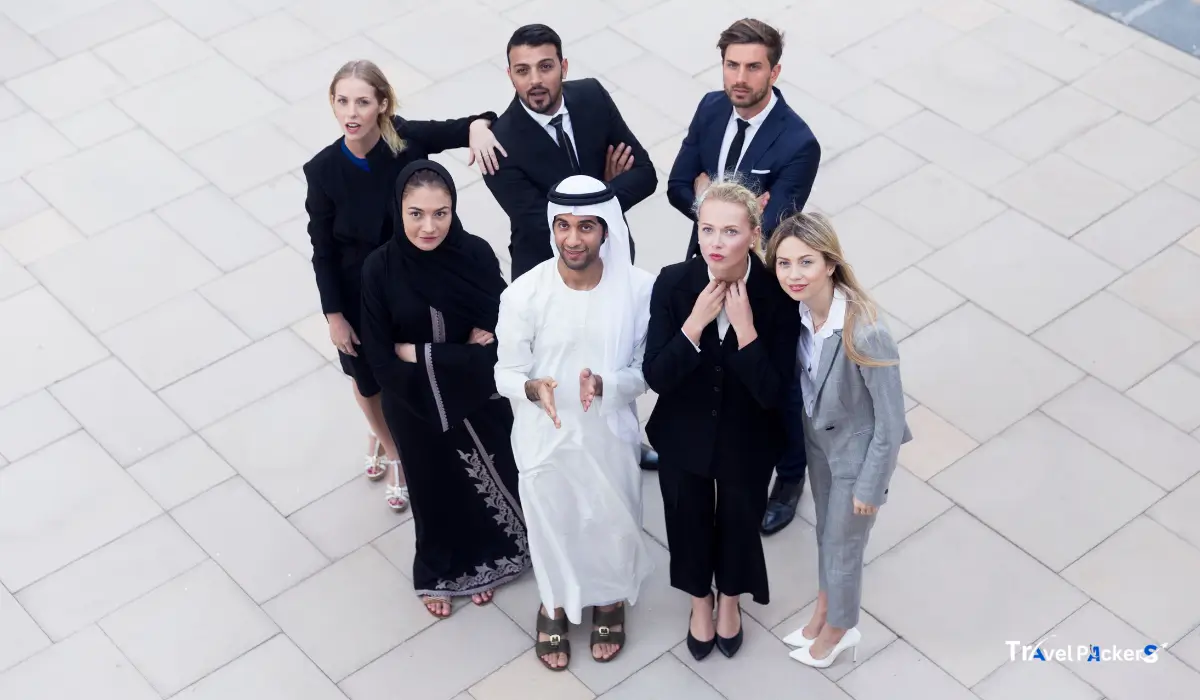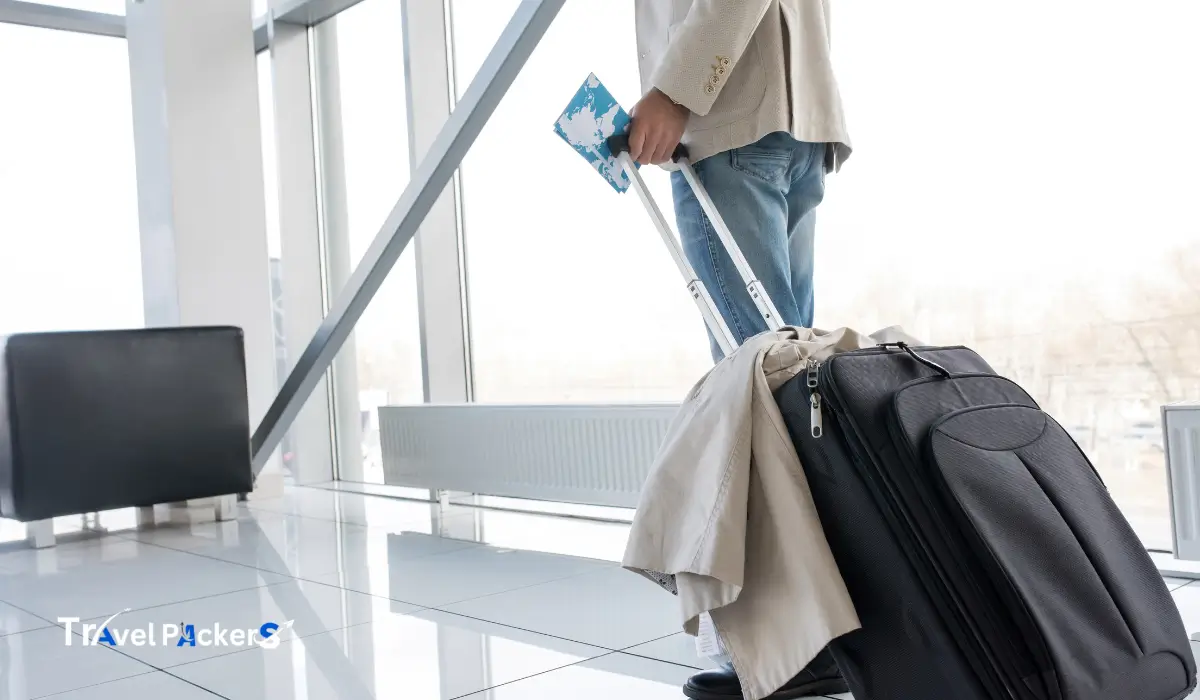Are you planning your first trip to Oman? This Oman travel advice for foreigners will help you get ready for an amazing trip to this beautiful Arabian country. Oman is a safe and friendly place in the Middle East where you can see pristine beaches, old forts, and meet kind people. This complete guide covers everything you need to know for a perfect vacation.
Getting Your Visa Ready – Complete Information
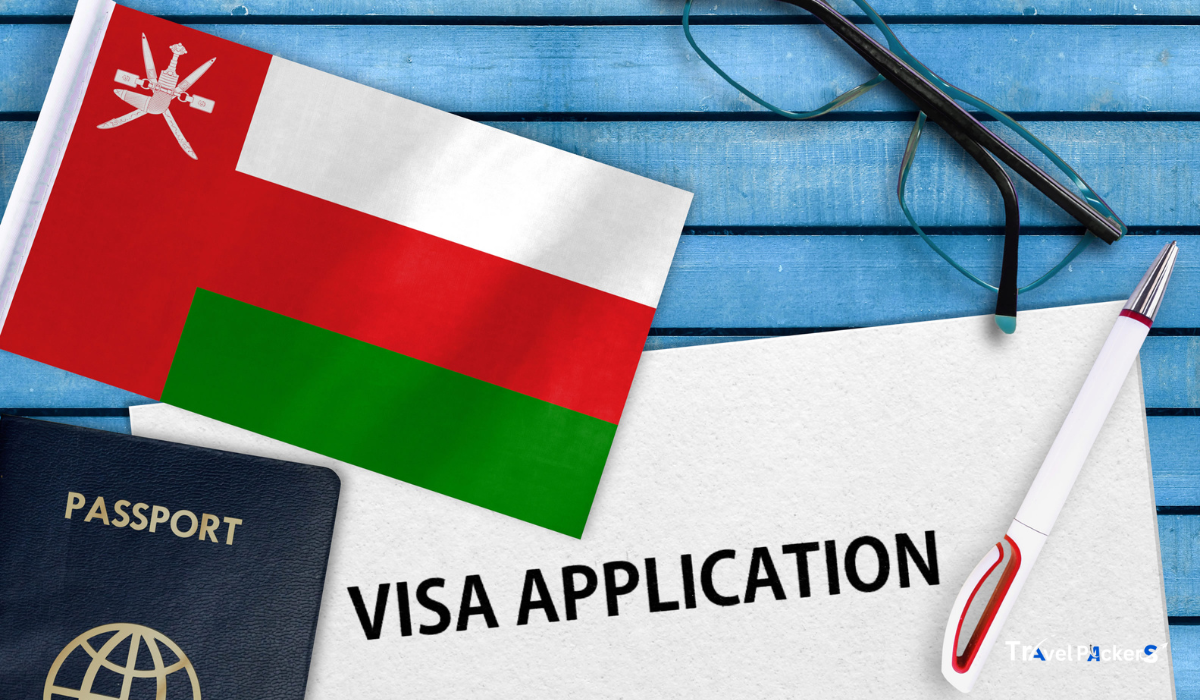
Before you pack your bags, you need to sort out your visa. This is important Oman travel advice for foreigners – most people can get a tourist visa when they arrive at the airport or online before they travel. The visa process is simple and fast.
Visa requirements and options:
- Your passport must be good for at least 6 months from entry date
- Tourist visa costs about 20 Omani Rials (around $52)
- You can stay for 30 days with a tourist visa
- Multiple entry visas available for frequent visitors
- People from nearby Gulf countries don’t need a visa
- Americans, British, Canadians, and many Europeans can buy visas at the airport
- Children under 18 get free visas if traveling with parents
How to get your visa:
- Online eVisa system (easiest way)
- Visa on arrival at Muscat airport
- Through Omani embassy in your country
- Border crossings from UAE also accept visa applications
- Processing time is usually instant for online applications
Important documents to bring:
- Valid passport with blank pages
- Return flight ticket
- Hotel booking confirmation
- Proof of enough money for your stay
- Travel insurance (recommended but not required)
The sultanate makes it easy for visitors to come and enjoy their country. Just make sure you check the latest rules on the official government website before you travel.
Special visa situations:
- Work visas need company sponsorship
- Student visas require university acceptance
- Family visit visas need local sponsor
- Business visas for conferences and meetings
- Transit visas for airport layovers over 24 hours
Money Matters in Oman – Complete Financial Guide
The money in Oman is called the Omani Rial (OMR). This Oman travel advice for foreigners is really important – the Omani Rial is worth a lot! One Rial equals about $2.60, so things might cost more than you expect.
Understanding Omani money:
- 1 Omani Rial = 1000 Baisa (smaller coins)
- Notes come in 1, 5, 10, 20, and 50 Rial amounts
- Coins are 5, 10, 25, 50, 100, and 500 Baisa
- Always check exchange rates before spending
- Prices are usually shown in Rials, not Baisa
Money exchange tips:
- Airport exchange counters have fair rates
- Banks offer the best exchange rates
- Hotels exchange money but rates may be higher
- Exchange shops in cities are convenient
- Avoid street money changers
- Keep your exchange receipts
Daily budget planning:
- Budget travelers: 20-30 Rials per day
- Mid-range travelers: 50-80 Rials per day
- Luxury travelers: 100+ Rials per day
- Food costs: 3-15 Rials per meal
- Hotel costs: 15-200+ Rials per night
- Car rental: 15-40 Rials per day
Payment methods everywhere:
- Credit cards work in hotels, restaurants, and big shops
- Visa and Mastercard widely accepted
- American Express less common
- Carry cash for traditional markets and small shops
- ATMs are easy to find in cities and towns
- Some places charge extra fees for card payments
Banking and ATM information:
- ATMs available 24 hours in cities
- Most ATMs accept international cards
- Withdrawal limits usually 200-300 Rials per day
- Small fees for foreign card use
- Banks open Saturday to Wednesday
- Thursday and Friday are weekend days
The Arabian Peninsula has different costs in each country, and Oman can be more expensive than some of its neighbors.
Weather and When to Visit – Detailed Climate Guide
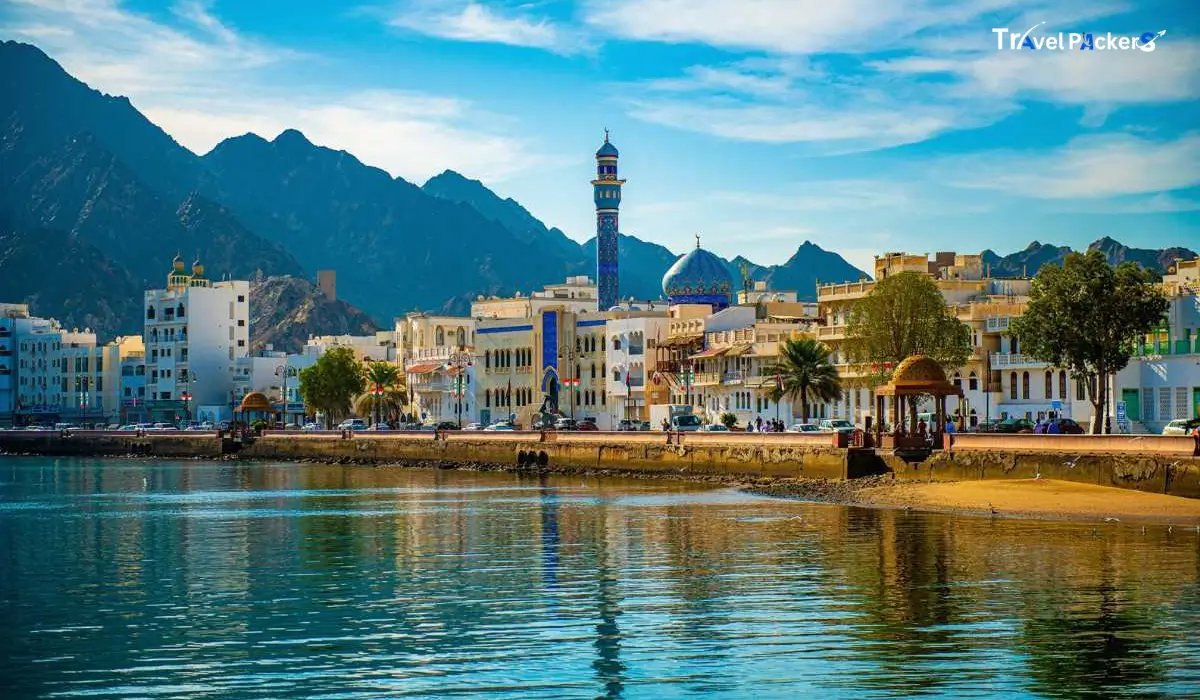
Oman gets very hot, so timing your visit is key Oman travel advice for foreigners should remember. The country has different climate zones, and understanding them helps you plan better.
Complete monthly weather guide:
October to March (Best time):
- October: 25-35°C, perfect weather starts
- November: 20-30°C, ideal for all activities
- December: 18-28°C, coolest month, may need jacket at night
- January: 17-27°C, excellent for hiking trails and desert expeditions
- February: 19-29°C, great for beach holidays and outdoor fun
- March: 22-32°C, still comfortable, getting warmer
April to September (Hot season):
- April: 26-36°C, getting hot but manageable
- May: 30-40°C, very hot, indoor activities better
- June: 32-42°C, extremely hot, Salalah beaches get monsoon
- July: 30-38°C in Salalah, 35-45°C elsewhere
- August: 29-37°C in Salalah, 34-44°C elsewhere
- September: 28-38°C, still very hot, weather improving
Regional weather differences:
- Coastal areas are more humid but slightly cooler
- Mountain regions like Jebel Shams are 5-10°C cooler
- Desert areas have big temperature changes day to night
- Salalah beaches area has monsoon June to August
- Northern mountains can be cold in winter nights
What to expect each season:
- Winter: Perfect weather, busy tourist season, higher prices
- Spring: Good weather, fewer tourists, moderate prices
- Summer: Very hot, low tourist season, cheaper prices
- Monsoon (Salalah): Cool and misty, special experience
Packing for weather:
- Light clothes for day time
- Warm jacket for winter evenings
- Rain jacket for Salalah monsoon
- Sun protection always essential
- Layered clothing works best
Understanding Local Culture – Deep Dive into Omani Society
Respecting local ways is the most important Oman travel advice for foreigners you can follow. Oman follows Islamic culture, but people are very welcoming to visitors. Understanding the culture makes your trip much better.
Religion and daily life:
- Islam is the main religion (about 85% of people)
- Five prayer times daily affect some business hours
- Call to prayer heard from mosques (beautiful sound)
- Respect prayer times when visiting religious places
- Religious landmarks are open to visitors with respect
Social customs and manners:
- Handshakes are normal for greeting
- Men and women may not shake hands with opposite gender
- Remove shoes when entering homes
- Accept offered hospitality (coffee, dates, food)
- Don’t show bottom of your feet to others
- Right hand for eating and giving things
Family and gender roles:
- Families are very important in Arabian culture
- Women work and drive but may dress conservatively
- Respect for elderly people is very strong
- Children are loved and welcomed everywhere
- Mixed groups are normal in cities and tourist areas
Dress code details:
- Cover shoulders, chest, and knees always
- Long pants better than shorts for men
- Long sleeves good for sun protection too
- Loose clothes are cooler and more respectful
- Swimwear only at beaches and pools
- Nice clothes for restaurants and hotels
Business culture:
- Meetings may start with coffee and chat
- Business cards given with both hands
- Relationships important before business
- Friday and Saturday are weekend days
- Ramadan affects business hours and socializing
Holidays and celebrations:
- Eid festivals are biggest celebrations
- National Day (November 18) is major holiday
- Responsible tourism means respecting local celebrations
- Many shops close during major religious holidays
- Hotels and tourist areas usually stay open
Language and communication:
- Arabic is official language
- English widely spoken in tourist areas
- Hindi and Urdu also common due to expat workers
- Speaking slowly helps if language is a problem
- Smiling and being polite works everywhere
Talking with Local People – Communication Guide
Arabic is the main language, but many people speak English, especially in tourist destinations and hotels. Learning a few Arabic words will make people happy and help you connect better.
Essential Arabic phrases for travelers:
- “As-salamu alaykum” = Hello (peace be upon you)
- “Wa alaykum as-salam” = Hello back (and peace upon you)
- “Ahlan wa sahlan” = Welcome
- “Shukran” = Thank you
- “Afwan” = You’re welcome
- “Ma’a salama” = Goodbye
- “Inshallah” = God willing (very common expression)
- “Mashallah” = What God has willed (shows appreciation)
Useful everyday words:
- “Naam” = Yes
- “La” = No
- “Kam?” = How much?
- “Ayna?” = Where?
- “Mata?” = When?
- “Maiya” = Water
- “Ta’am” = Food
- “Funduq” = Hotel
- “Sayara” = Car
- “Shams” = Sun
Numbers in Arabic (helpful for shopping):
- Wahid = One
- Ithnain = Two
- Thalatha = Three
- Arba = Four
- Khamsa = Five
- Sitta = Six
- Saba = Seven
- Thamaniya = Eight
- Tisa = Nine
- Ashara = Ten
This simple Oman travel advice for foreigners helps you connect with locals in mountain villages, traditional markets, and Bedouin communities. Most signs in tourist areas have English, and your phone’s map will work well in cities.
Non-verbal communication:
- Thumbs up means good/okay
- Pointing with one finger can be rude
- Hand on heart shows sincerity
- Looking people in eyes shows respect
- Smiling is universal and always welcome
Getting Around Oman – Complete Transportation Guide
Renting a car is the best way to see Oman, but this Oman travel advice for foreigners is important: you need an international driving license along with your regular one.
Car rental complete guide:
- International driving permit required
- Must be 21 years old minimum (25 for some companies)
- Major rental companies: Avis, Hertz, Budget, local companies
- Cheaper local companies often good quality
- Book online for better prices
- Insurance highly recommended
Types of vehicles:
- Small cars: Good for cities and main roads
- SUVs: Better for desert driving and wadi exploration
- 4×4 vehicles: Essential for serious off-road trips
- Luxury cars: Available for luxury travel experience
- Motorcycles: Not recommended due to heat and safety
Driving rules and tips:
- Drive on the right side of the road
- Speed limits: 120 km/h highways, 60 km/h cities
- Seat belts required for everyone
- Mobile phone use while driving is illegal
- Drunk driving has very serious penalties
- Police are helpful but follow rules strictly
Road conditions:
- Main highways are excellent quality
- Mountain roads are good but can be winding
- Desert tracks need 4×4 and experience
- Some wadis require very careful driving
- GPS works well on main roads
- Paper maps good backup for remote areas
Fuel and services:
- Gas stations common on main routes
- Fuel is cheap compared to many countries
- Most stations accept credit cards
- Full service available at many stations
- Plan fuel stops for desert expeditions
- Spare tire and tools important for remote areas
Public transportation options:
- ONTC buses connect major cities
- Comfortable and air-conditioned
- Good for backpackers and budget travel
- Schedules may change, check locally
- No buses to small villages
Taxi services:
- City taxis available in Muscat and major towns
- Agree on price before starting trip
- Hotel taxis more expensive but reliable
- Shared taxis for longer distances
- Uber available in some areas
Organized tours:
- Day trips to popular attractions
- Multi-day desert expeditions
- Cultural experiences with guides
- Adventure tourism packages
- Good for people who don’t want to drive
- Local guides provide excellent information
- Perfect for best group travel in the world experiences
- Group discounts often available
Domestic flights:
- Oman Air connects major cities
- Muscat to Salalah most popular route
- Small airports in some regions
- More expensive than ground transport
- Good for saving time on long distances
Staying Safe and Healthy – Complete Health and Safety Guide
Oman is one of the world’s safest countries. This Oman travel advice for foreigners should make you feel good about visiting. Crime is very rare, and local people are honest and helpful.
Personal safety information:
- Violent crime extremely rare
- Petty theft uncommon but possible
- Women can travel safely alone
- Solo travelers generally very safe
- Police are helpful and speak English
- Emergency number is 999
Common safety precautions:
- Keep copies of important documents
- Don’t leave valuables visible in cars
- Use hotel safes for passport and money
- Be aware of surroundings in crowded areas
- Trust your instincts about people and situations
- Avoid isolated areas alone at night
Health and medical information:
- No special vaccinations required for most countries
- Routine shots should be up to date
- Malaria not a problem in Oman
- Private hospitals excellent quality
- Public healthcare available for emergencies
- Travel insurance strongly recommended
Sun and heat safety:
- Biggest health risk is sun exposure and dehydration
- Use SPF 50+ sunscreen always
- Reapply sunscreen every 2 hours
- Wear hat and sunglasses
- Drink water constantly (3-4 liters per day)
- Take breaks in shade during hottest hours (11am-4pm)
Water and food safety:
- Tap water safe in cities
- Bottled water widely available
- Ice is generally safe in hotels and restaurants
- Street food usually safe from busy vendors
- Avoid raw vegetables from street vendors
- Wash hands frequently
Medical facilities:
- Excellent private hospitals in major cities
- Government hospitals provide emergency care
- Pharmacies well-stocked and common
- Many doctors speak English
- Prescription medicines available
- Emergency dental care available
Desert and outdoor safety:
- Never go to desert alone
- Tell someone your plans
- Carry extra water and food
- GPS device or satellite phone for remote areas
- First aid kit essential
- Know signs of heat exhaustion
Road safety:
- Excellent road conditions but drive carefully
- Desert roads can be challenging
- Flash floods possible in wadis during rain
- Animals may cross roads, especially at night
- Carry emergency supplies for long trips
- Mobile phone coverage good on main roads
What to Pack – Complete Packing Guide
Smart packing makes your trip better. This practical Oman travel advice for foreigners covers what you really need for different types of activities.
Essential clothing for all travelers:
- Light, long-sleeved shirts (cotton or linen best)
- Long pants or loose trousers
- Modest knee-length shorts for men
- Light jacket or sweater for evenings
- Comfortable walking shoes with good support
- Sandals for beach and casual wear
- Socks and underwear for hot weather
- Pajamas or sleepwear
Sun protection essentials:
- Wide-brimmed hat or cap
- Quality sunglasses (UV protection)
- SPF 50+ sunscreen
- Lip balm with sun protection
- Light scarf for extra head/neck coverage
- Long-sleeved swim shirt for beach
Electronics and accessories:
- Phone charger and backup battery
- Universal power adapter (Type G British plugs)
- Camera and extra batteries/memory cards
- Headphones for entertainment
- E-reader or books for relaxation
- Flashlight or headlamp
Personal care items:
- Personal medications (bring extra)
- Basic first aid supplies
- Insect repellent
- Hand sanitizer
- Toothbrush and toothpaste
- Shampoo and soap (hotels provide basics)
- Feminine hygiene products
For desert activities:
- Closed-toe shoes for camel trekking
- Thick socks to prevent sand entry
- Bandana or head covering
- Warm clothes for desert camps (nights get cold)
- Sleeping bag liner for camping
- Wet wipes for cleaning without water
For water activities:
- Modest swimwear
- Beach towel (some hotels provide)
- Waterproof bag for electronics
- Snorkeling gear if you have it
- Water shoes for rocky beaches
- Quick-dry clothing
For mountain hiking:
- Sturdy hiking boots
- Moisture-wicking clothing
- Warm layers for altitude
- Rain jacket (for Salalah beaches monsoon)
- Hiking backpack
- Water bottles or hydration system
Documents and money:
- Passport (keep copy separate)
- Visa documents
- Travel insurance papers
- Flight tickets and hotel confirmations
- Credit cards and cash
- Emergency contact information
- Complete packing list for international business travel if visiting for work
- Business cards and meeting documents
Food and Drinks – Complete Culinary Guide
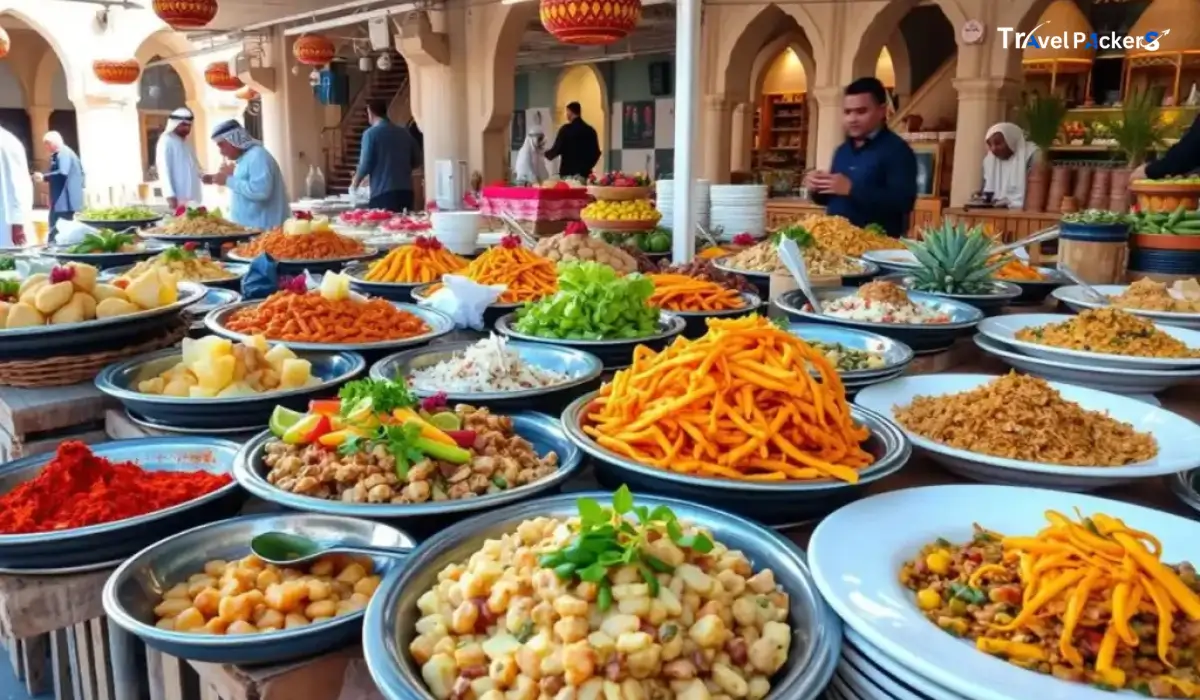
Omani food mixes tastes from Arabia, India, and Africa. The local delicacies are worth trying, and this Oman travel advice for foreigners will help you enjoy them safely and fully.
Traditional Omani dishes you must try:
- Shuwa: Slow-cooked spiced lamb (cooked underground for 2 days)
- Majboos: Fragrant rice with meat, similar to biryani
- Mashuai: Grilled kingfish with rice
- Madrouba: Rice porridge with chicken or fish
- Harees: Wheat and meat dish, very filling
- Mishkak: Grilled meat skewers
- Luqaimat: Sweet dumplings with honey
- Halwa: Traditional sweet dessert
Fresh seafood from coastal areas:
- Kingfish (most popular local fish)
- Hamour (grouper)
- Red snapper
- Prawns and shrimp
- Lobster from local fishing communities
- Abalone (expensive delicacy)
- Tuna and other ocean fish
- Fish curry with rice
Omani beverages:
- Arabic coffee (qahwa) – strong and spiced
- Tea (shai) – usually sweet and strong
- Fresh fruit juices
- Laban (buttermilk drink)
- Rose water drinks
- Date syrup mixed with milk
- Fresh coconut water in Salalah
International food available:
- Indian and Pakistani restaurants very common
- Lebanese and other Arab cuisines
- Italian restaurants in hotels
- Chinese food in major cities
- Fast food chains (McDonald’s, KFC, etc.)
- Thai and other Asian cuisines
- Western-style cafes and bakeries
Where to eat and food costs:
- Hotel restaurants: 8-25 Rials per meal
- Local restaurants: 2-8 Rials per meal
- Fish markets with cooking: 3-10 Rials
- Street food: 1-3 Rials per item
- Spice markets for ingredients and snacks
- Food courts in malls: 3-8 Rials
Food safety and dietary restrictions:
- Halal food everywhere (no pork, alcohol in cooking)
- Vegetarian options widely available
- Vegan food possible but ask about dairy/eggs
- Gluten-free options limited, bring supplements
- Food allergies – learn Arabic names for allergens
- Pregnant women should avoid street food
Dining customs and etiquette:
- Right hand for eating always
- Sharing food is common and welcomed
- Don’t refuse offered food/drink (considered rude)
- Finish what’s on your plate
- Tipping 10% in restaurants appreciated
- Some restaurants have family sections
Markets and food shopping:
- Traditional souks for spices and dates
- Modern supermarkets for familiar items
- Fish markets early morning for best selection
- Fruit and vegetable markets
- Hypermarkets like Lulu and Carrefour
- Local bakeries for fresh bread
The Omani hospitality includes sharing food and drinks with guests. This is part of Arabian culture and Middle Eastern traditions.
Shopping for Souvenirs – Complete Shopping Guide
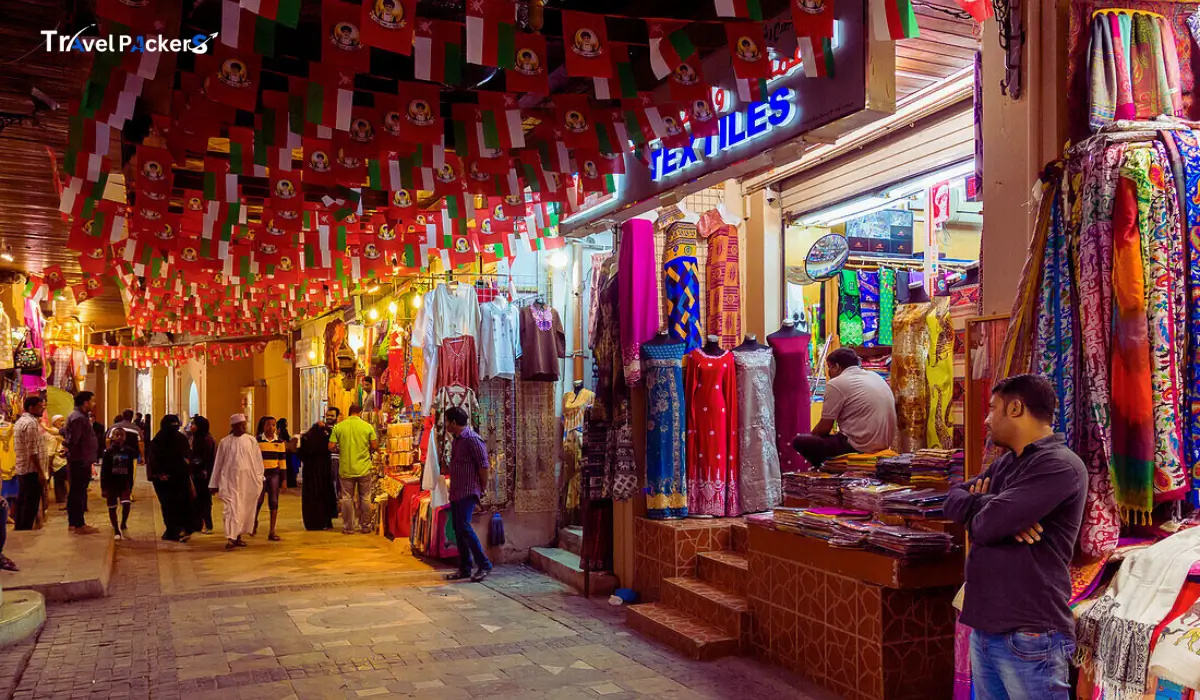
Shopping in Oman is fun, especially in traditional souks. These traditional markets are full of handicrafts and local crafts.
Authentic Omani souvenirs:
- Frankincense (Oman produces world’s best quality)
- Silver jewelry (traditional designs)
- Khanjar (traditional curved dagger – ceremonial only)
- Omani caps (kumma) – colorful embroidered hats
- Traditional textiles and fabrics
- Handwoven carpets and rugs
- Rose water and perfumes
- Dates (many varieties available)
- Pottery and ceramics
- Traditional coffee pots (dallah)
Best places for authentic shopping:
- Mutrah Souk, Muscat (most famous, best variety)
- Nizwa Souk (famous for handicrafts and silver)
- Sur Souk (good for traditional items)
- Salalah Souk (frankincense and southern specialties)
- Bahla (famous for pottery)
- Local mountain villages for authentic crafts
Modern shopping options:
- Muscat City Centre (large mall)
- Oman Avenues Mall (newest and biggest)
- Qurum City Centre
- Lulu Hypermarket (everything under one roof)
- Modern districts with international brands
- Duty-free shopping at airport
Bargaining guide:
- Expected in traditional souks and markets
- Not appropriate in modern malls and shops
- Start at 50% of asking price
- Be polite and patient
- Walk away if price too high
- Come back later for better deals
- Cash payment gets better prices
Shopping costs:
- Small frankincense pieces: 2-10 Rials
- Silver jewelry: 15-100+ Rials
- Traditional daggers: 20-200+ Rials
- Carpets: 50-500+ Rials
- Pottery: 5-50 Rials
- Dates: 2-10 Rials per kilogram
- Perfumes: 10-50 Rials
Shipping and customs:
- Large items can be shipped home
- Check customs rules for your country
- Keep receipts for valuable items
- Some items may need export permits
- Postal service reliable for small items
- DHL and FedEx available for fast shipping
Quality tips:
- Check silver hallmarks for authenticity
- Smell frankincense – good quality has strong aroma
- Test fabric quality and colorfastness
- Examine pottery for cracks
- Ask about return/exchange policies
- Buy from established shops for expensive items
Technology and Internet – Complete Digital Guide

Staying connected in Oman is easy. This helps travel bloggers, digital nomads, and solo travelers stay in touch.
Internet access everywhere:
- WiFi in most hotels (usually free)
- Cafes and restaurants offer WiFi
- Shopping malls have free internet
- Airports provide free WiFi
- Some beaches and parks have hotspots
- Speed generally good in cities
Mobile phone services:
- Two main companies: Omantel and Ooredoo
- Tourist SIM cards at airport
- Prepaid plans starting from 5 Rials
- Data packages very affordable
- Good coverage in cities and main roads
- Spotty coverage in remote desert areas
International roaming:
- Most international plans include Oman
- Roaming can be expensive
- Check with your provider before traveling
- Consider local SIM for longer stays
- WhatsApp and messaging apps work well
Useful apps for Oman:
- Google Maps (works offline too)
- Google Translate (Arabic-English)
- Uber (available in some areas)
- Weather apps for planning
- Currency converter apps
- Hotel booking apps
- Flight tracking apps
Social media and communication:
- WhatsApp very popular locally
- Instagram and Facebook widely used
- Video calling works well
- Skype and other VOIP services available
- Most international websites accessible
- No major internet restrictions
Digital payments:
- Credit cards widely accepted
- Mobile payment apps growing
- Online banking available
- ATMs connect to international networks
- Apple Pay and Google Pay in some places
- Cash still preferred in traditional areas
Power and charging:
- Type G plugs (same as UK)
- 240V electrical system
- Universal adapters work
- USB charging common in hotels
- Power banks useful for long trips
- Car chargers available for road trips
Photography and storage:
- Excellent photo opportunities everywhere
- Cloud storage works well for backup
- Bring extra memory cards
- Drone regulations – check before bringing
- Respect privacy when photographing people
- Some military areas prohibit photography
Different Types of Travelers – Detailed Guides
Oman works well for many different kinds of trips:
For luxury travelers:
- Five-star resorts along beaches
- Luxury travel desert camps with air conditioning
- Private guides and drivers
- Helicopter tours of mountains
- Exclusive cultural experiences
- Spa treatments and wellness centers
- Fine dining restaurants
- World-class hospitality everywhere
- Costs: 150-500+ Rials per day
For budget travelers:
- Hostels and budget hotels (15-40 Rials/night)
- Public buses for transportation
- Street food and local restaurants
- Free beaches and hiking trails
- Self-guided tours
- Camping in designated areas
- Group tours for better prices
- Backpackers communities and tips
- Costs: 20-50 Rials per day
For adventure travelers:
- Adventure tourism activities everywhere
- Rock climbing in mountains
- Desert expeditions and camping
- Wadi exploration and swimming
- Camel trekking experiences
- Scuba diving and snorkeling
- Mountain hiking and trekking
- Off-road adventures
- Costs: 40-120 Rials per day
For family travelers:
- Family-friendly hotels and resorts
- Safe environment for children
- Educational cultural heritage sites
- Beach activities for all ages
- National parks with easy trails
- Interactive museums
- Traditional crafts workshops
- Sightseeing tours suitable for kids
- Perfect destination for traveling the world with family
- Costs: 80-200 Rials per day for family
For solo travelers:
- Very safe for independent travel
- Easy to meet other travelers
- Flexible itineraries
- Solo travelers groups and meetups
- Good public transportation
- Helpful locals everywhere
- Women traveling alone feel safe
- Digital nomads communities
- Excellent choice when considering which country is best for a solo trip
- Costs: 30-100 Rials per day
For cultural enthusiasts:
- Traditional markets and crafts
- Religious landmarks and mosques
- Historical sites and museums
- Bedouin communities experiences
- Traditional music and dance
- Cooking classes and food tours
- Language exchange opportunities
- Arabian culture immersion
- Costs: 40-80 Rials per day
Special Activities You Can Do – Comprehensive Activity Guide
Oman offers many unique experiences:
Desert activities and experiences:
- Camel trekking in Wahiba Sands (half-day to multi-day)
- Overnight camping in desert camps
- Sandboarding on huge dunes
- Quad biking and dune bashing
- Star gazing (amazing clear skies)
- Traditional Bedouin experiences
- Desert photography workshops
- Sunrise and sunset tours
- Desert expeditions with guides
Water and marine activities:
- Swimming at pristine beaches
- Snorkeling in clear waters
- Scuba diving (excellent sites)
- Dolphin watching boat trips
- Deep sea fishing
- Traditional dhow sailing
- Surfing (limited spots)
- Beach volleyball and sports
- Coastal areas exploration
Mountain and adventure activities:
- Hiking in Jebel Shams (Grand Canyon of Arabia)
- Wadi exploration and swimming
- Rock climbing and rappelling
- Mountain biking trails
- Cave exploration
- Hiking trails of all difficulties
- Photography tours
- Camping in mountains
- Traditional mountain villages visits
Cultural and historical activities:
- Fort and castle visits
- Traditional markets exploration
- Handicraft workshops
- Cooking classes
- Arabic language lessons
- Traditional dance performances
- Music concerts and festivals
- Religious landmarks tours
- Museum visits
Modern and luxury activities:
- Spa and wellness treatments
- Golf courses (several available)
- Luxury travel experiences
- Shopping in modern malls
- Fine dining experiences
- Art galleries and exhibitions
- Business conferences
- Modern districts exploration
Seasonal special activities:
- Monsoon experiences in Salalah
- Turtle watching (certain seasons)
- Bird watching migrations
- Frankincense tree visits
- Date harvest participation
- Traditional festivals
- National parks seasonal tours
- Weather-specific activities
Regional Differences – Complete Regional Guide

Oman has different regions with their own special things:
Muscat and Capital Area:
- Modern capital city
- Muscat attractions include Sultan Qaboos Grand Mosque
- Royal Opera House and cultural venues
- Mutrah Corniche and souk
- Beautiful beaches nearby
- Mix of old and new architecture
- Best infrastructure for tourists
- International restaurants and hotels
- Cultural heritage sites everywhere
Northern Oman (Batinah and Dakhliyah):
- Green date palm oases
- Traditional mountain villages
- Ancient forts and castles
- Wadis with swimming holes
- Cooler mountain climate
- Traditional crafts centers
- Less touristy and more authentic
- Good hiking trails and nature
Eastern Oman (Sharqiyah):
- Wahiba Sands desert experience
- Traditional Bedouin communities
- Turtle watching beaches
- Local fishing communities
- More conservative and traditional
- Excellent for adventure tourism
- Sur city with dhow building
- Beautiful coastal areas
Southern Oman (Dhofar):
- Salalah beaches and coconut trees
- Monsoon season (khareef) June-August
- Frankincense trees and history
- Different culture from north
- Archaeological sites
- Unique landscape and vegetation
- Eco-tourism opportunities
- Less crowded than north
Western Oman (Dhahirah):
- Remote and less visited
- Traditional desert lifestyle
- Archaeological sites
- Border with UAE and Saudi Arabia
- More challenging travel
- Authentic experiences
- Limited tourist facilities
- Good for experienced travelers
Central Oman (Interior):
- Historical capital Nizwa
- Traditional souks and crafts
- Mountain landscapes
- Ancient fortresses and towns
- Traditional agriculture
- Conservative culture
- Educational opportunities
- Day trips from Muscat
Planning Your Itinerary – Detailed Planning Guide
Here’s how to plan your time based on how long you stay:
One week trip (7 days):
- Day 1-2: Arrive Muscat, city tour, traditional souks
- Day 3: Nizwa fort and souk day trip
- Day 4: Wadi exploration and mountain village
- Day 5: Desert excursions and camel trekking
- Day 6: Beach day and relaxation
- Day 7: Last minute shopping and departure
Two week trip (14 days):
- Days 1-3: Muscat area exploration
- Days 4-5: Northern mountains and historical sites
- Days 6-7: Desert expeditions and camping
- Days 8-9: Eastern coast and turtle watching
- Days 10-11: Southern Oman and Salalah beaches
- Days 12-13: Adventure tourism activities
- Day 14: Return and departure
Three week trip (21 days):
- Week 1: Northern Oman comprehensive tour
- Week 2: Desert and adventure tourism
- Week 3: Southern Oman and relaxation
- Extra time for cultural experiences
- Deeper exploration of national parks
- More interaction with local communities
- Luxury travel experiences
- Photography and hobby time
Seasonal planning considerations:
- Winter (Nov-Mar): Perfect for all activities
- Summer (May-Sep): Focus on coastal areas and mountains
- Monsoon (Jun-Aug): Salalah region special experience
- Ramadan: Respect fasting, some activities limited
- National holidays: Book accommodations early
Budget planning by trip length:
- 1 week: 300-2000 Rials total
- 2 weeks: 600-4000 Rials total
- 3 weeks: 900-6000 Rials total
- Costs vary greatly by travel style
- Luxury travel costs much more
- Budget travelers can spend much less
Final Tips for Success – Complete Success Guide
This complete guide gives you everything you need to know, but here are the most important points:
Before you travel checklist:
- Check visa requirements one final time
- Get comprehensive travel insurance
- Notify banks about international travel
- Download offline maps and translation apps
- Research current weather and events
- Book accommodations for first few nights
- Check health requirements and medications
- Make copies of important documents
Packing final reminders:
- Less is more – you can buy things there
- Focus on sun protection and modest clothes
- Bring good walking shoes
- Don’t forget universal power adapter
- Pack medications with prescriptions
- Leave valuable jewelry at home
Cultural respect guidelines:
- Always dress modestly
- Learn basic Arabic greetings
- Respect prayer times and religious practices
- Be patient with different ways of doing things
- Accept hospitality when offered
- Tip appropriately but don’t over-tip
- Be respectful when taking photos
Safety and health reminders:
- Stay hydrated constantly
- Use sunscreen religiously
- Keep copies of documents separate
- Have emergency contact information
- Know location of nearest hospital
- Carry basic first aid supplies
- Trust your instincts about situations
Making the most of your experience:
- Be open to trying new foods
- Talk to local people whenever possible
- Visit both modern and traditional places
- Take time to really see places, don’t rush
- Try activities you’ve never done before
- Buy authentic souvenirs from real artisans
- Take lots of photos but also just enjoy moments
Money and practical tips:
- Have cash and cards both
- Keep money in different places
- Save receipts for expensive purchases
- Tip service people appropriately
- Bargain respectfully in traditional markets
- Plan for higher costs than some countries
Communication tips:
- Download translation apps
- Learn numbers in Arabic for shopping
- Smile and be patient
- Use gestures when words don’t work
- Find people who speak English if needed
- Write down your hotel address in Arabic
Creating lasting memories:
- Keep a travel journal
- Collect unique souvenirs
- Take photos with local people (with permission)
- Try to learn something new every day
- Be present and enjoy each moment
- Share experiences with family and friends
- Plan return visits to favorite places
Oman is truly a hidden gem that offers something for everyone. Whether you want luxury travel, adventure tourism, or simple cultural experiences, this amazing Gulf state will not disappoint you.
The country combines old traditions with modern comfort, making it perfect for visitors who want to experience real Arabian culture without giving up safety and convenience. From busy traditional souks to quiet desert camps, from ancient fortresses to pristine beaches, Oman has memories waiting for every type of traveler.
Remember that each trip is different, but following this Oman travel advice for foreigners will help make sure your visit is amazing. The people of Oman are known for their world-class hospitality, and you’ll likely leave with new friends and wonderful memories that last forever.
This beautiful sultanate offers experiences you cannot find anywhere else in the world. The combination of natural beauty, rich history, modern facilities, and incredibly welcoming people makes Oman one of the world’s best travel destinations.
Welcome to Oman – get ready to fall in love with this special place and create memories that will last your whole life!
Oman Travel Advice for Foreigners: FAQ
Is it safe to travel to Oman?
Yes, Oman is considered one of the safest countries in the world. The crime rate is very low, and locals are known for their hospitality and friendliness. Petty crimes like pickpocketing are rare, making Oman a safe destination for solo travelers, including female travelers.
Do I need a visa to visit Oman?
It depends on the length of your stay and your nationality. Travelers from over 100 countries can enter Oman visa-free for up to 14 days. If you plan to stay longer, you must apply for a tourist visa online via the Royal Oman Police portal. Ensure your passport is valid for at least six months from your arrival date.
When is the best time to visit Oman?
The ideal time to visit Oman is between October and April when the weather is cooler and more comfortable for outdoor activities. During these months, temperatures are mild, ranging between 70°F to 85°F (20°C to 29°C), making it perfect for exploring wadis, deserts, and beaches.
What is the dress code in Oman for tourists?
Oman is a conservative country, so tourists are advised to dress modestly. Clothing should cover shoulders and knees, especially when visiting mosques or rural areas. Women visiting mosques must also wear a headscarf. Swimwear is acceptable at private hotel pools and beaches but should be avoided in public areas.
Can I drink alcohol in Oman?
Yes, but only in licensed venues like hotels, restaurants, and private clubs. The legal drinking age is 21, and drinking or being intoxicated in public is prohibited. Non-Muslim travelers are allowed to bring up to two liters of alcohol into the country through Muscat International Airport.
What’s the best way to get around in Oman?
Renting a car is the best option for exploring Oman, as public transport is limited. The road infrastructure is excellent, making driving easy and safe. If you plan to visit off-road destinations like Wadi Shab or Jebel Akhdar, renting a 4WD is recommended.
Are there any cultural etiquette rules I should follow?
Yes, respecting Omani customs is important. Avoid public displays of affection, use your right hand to eat or greet people, and remove your shoes before entering someone’s home. Always ask for permission before photographing people, especially women, and refrain from discussing sensitive topics like politics or religion.
Can I drink tap water in Oman?
While tap water is safe for washing and brushing your teeth, it’s recommended to drink bottled water. Bottled water is readily available and inexpensive throughout the country.
What should I pack for a trip to Oman?
Pack modest clothing, comfortable shoes for exploring, sunscreen, a hat, and water shoes for wadi trips. Also, bring tissues and hand sanitizer for public toilets, as some may lack supplies. If you take medication, carry your prescription and avoid any banned substances.
Are there rules I should know about during Ramadan?
During Ramadan, eating, drinking, or smoking in public is prohibited during daylight hours, even for non-Muslims. After sunset, it’s fine to eat and drink as usual. Additionally, dress modestly and be mindful of the quieter, more reflective nature of the month.

